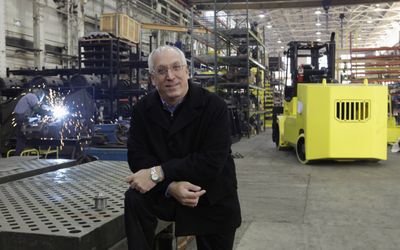Worker layoffs tough on boss, too
Giving bad news can be as painful as receiving it

SUNRISE, Fla. – One personnel manager wakes in despair at 4 a.m., worried about the employees in her company. Another boss has to remind himself to eat right and exercise so that he can handle the stress. A third says he has had tears in his eyes for months.
They are the bearers of bad news, the Grim Reapers, the corporate executioners, the office hatchet men. They’re the ones whose job is to tell employees they have been laid off. And these days, they’re miserable, too.
“It takes a huge amount of energy to ensure I don’t get emotional,” said Wendy Mahle, the human resources manager at Sunrise-based Perfumania, which just laid off 95 employees because it is moving its headquarters to New York’s Long Island. “If I started crying, that wouldn’t help anybody.”
American employers slashed 651,000 jobs in February, even more than analysts expected. When the monthly numbers come out, the focus is on the newly unemployed. Less attention is paid to the stress levels of those delivering the news. And they want it known they aren’t all cold-hearted, script-reading drones who don’t care about the people they are cutting loose.
Marty Flaska of Hoist Liftruck in Bedford Park, Ill., was the kind of company owner who befriended his employees. For years, he would joke on the factory floor with the machinists and welders. Now the smile is gone, the small talk rare.
His company, which makes fork- lifts, has gone from 330 employees six months ago to 79 now. Flaska has personally given pink slips to each laid-off employee, often to people whose children he has seen grow from toddlers to teens.
“I had tears in my eyes for months on end,” said Flaska, 48. “Some of these people have worked for me for 16 years, 17 years, 18 years.”
Bill Holmes, human resources chief for the athletic shoe manufacturer Reebok in Canton, Mass., said weeks of preparation precede the day of layoffs. Holmes, 46, said he tries to be mentally and physically ready by eating and sleeping right and getting his exercise.
His job, he said, is to make sure employees know why they are being laid off and what the company is offering in severance and assistance in finding a new job.
During the layoff meeting, Holmes listens to the employee and says he is “firm and clear” about why and how the decision was made. What he doesn’t do: utter hollow phrases like, “I know how you feel.”
Reactions from workers include shock, denial, anger and sadness, and Holmes braces himself for the question everyone asks: “Why me?”
For John Younger, chief executive of Accolo, a recruitment outsourcing company based in the San Francisco suburb of Larkspur, the decision to lay off a dozen of the company’s 54 employees came after a dreadful fourth quarter that saw clients stop hiring.
Employees were called into a room and told they would be called out one by one. Those who got the call were given the bad news individually.
One of the people he let go was second in seniority to Younger. “I was tearing up more than he was,” Younger said. “He was like, ‘It’s OK. I’ll be OK.’ ”